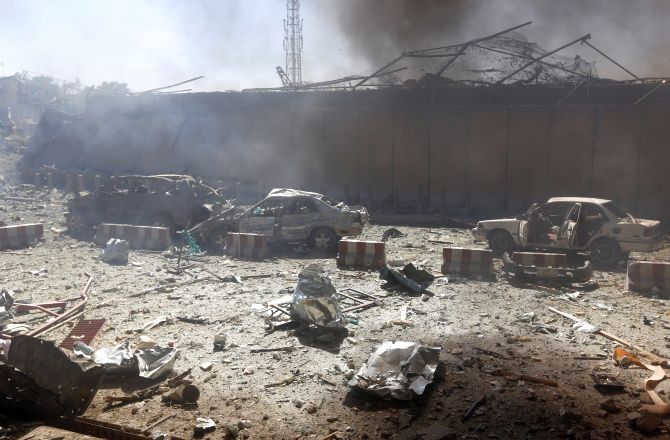'A couple of more such happenings in the coming weeks can push Kabul into total anarchy, and a Syria-like conflict may ensue,' warns Ambassador M K Bhadrakumar.

There are no takers so far for the estimation that the Haqqani network carried out the massive blast that hit Kabul's embassy district last Wednesday, May 31, and killed over 90 people and wounding more than 450 -- that is, aside from the Afghan intelligence (external link).
The US president, US state department, speaker of the US congress, UN secretary-seneral -- none of them seemed sure who the perpetrators were.
Meanwhile, Kabul residents have trained their wrath on the colossal security failure on the part of the security agencies, which is, of course, stunning insofar as such a massive terror attack could be staged right in the heart of the Afghan capital at rush hour.
A big demonstration in Kabul on Friday, June 2, demanded President Ashraf Ghani and CEO Abdullah Abdullah's resignations. Ghani's government has drawn the blood of Kabul residents in the holy month of Ramadan. Things can turn ugly.
Is this the end of the road for Ghani's so-called national unity government?
Neither Ghani nor Abdullah will voluntarily quit.
Ghani proved to be inept not only as a ruler, but also as a politician. But the Americans are stuck with him for good or bad and the regional States do not demand a transition in Kabul.
As for Abdullah, he is no longer the representative of THE 'Panjshiris' (Ahmad Shah Massoud's followers) who are today split into different factions.
One way out of the political deadlock is to convene a Loya Jirga to hold a torch light into the dark tunnel ahead, but then, the jirga might call on former president Hamid Karzai to step in as interim leader -- and that, of course, is completely unacceptable to the Americans.
It has become extremely difficult for the Americans to install another puppet regime in Kabul.
Indeed, last Wednesday's blast will impact President Donald Trump's Afghan strategy. In his phone call to Ghani after the blast, Trump kept his cards close to his chest (external link).
Much wrangling is going on amongst his senior strategists, which is apparently Trump's style of functioning until he finally makes up his mind.
More and more American analysts are asking what purpose will be served by dispatching a few thousand extra troops to Afghanistan. Read a frank assessment (external link) by an American colonel who served in Afghanistan for a (different kind of) change in Afghanistan. CNN's Nick Robertson took an almost identical view (external link) of the futility of the war.
Interestingly, a Chinese commentary dwelling on last Wednesday's blast in Kabul also counselled that 'more effort should be put into promoting the four-nation talks (involving Afghanistan, Pakistan, China and the US) on the Afghan peace process and speeding up the country's political reconciliation.'
It highlighted that 'Beijing's Belt and Road initiative could give strong economic backing to Afghanistan, a country along this route, and this will help alleviate Afghanistan's security turmoil.'
Indeed, on the sidelines of the Heart of Asia Conference in Islamabad last December, the four countries had agreed in principle to revive the peace talks, but nothing came of it.
Today, the Russian stance also favours a renewed bid for peace talks. Unsurprisingly, Russia favours an expanded inclusive format.
Following the blast in Kabul, Russian Foreign Minister Sergey Lavrov underscored the need to 'establish full-fledged coordination with participation of all external stakeholders without exceptions' and to eschew 'geopolitical games'.
Clearly, India too has a responsible role to play here.
What do we gain out of exacerbating Afghan-Pakistani tensions?
Of course, the kind of incredibly foolish thing that the RSS' foreign policy wonk Ram Madhav has done should be avoided at any rate -- rushing to hold the brief for Afghan intelligence (external intelligence).
Madhav should compulsively read at least a couple of times an opinion piece written on the state of play by a distinguished and erudite former Pakistani diplomat who is well-known in Delhi as a rational thinker and a rare voice of sobriety and moderation, Ashraf Jehangir Qazi -- Opportunity out of tragedy (external link).
Clearly, the time for mud slinging and cynical pastime is behind us, as the Kabul attack testifies.
A couple of more such happenings in the coming weeks can push Kabul into total anarchy, and a Syria-like conflict may ensue.
The bottom line is that a US-Russian coordinated effort is urgently needed, on lines similar to what is happening, finally, in Syria.
Only Trump can cut the Gordian knot.
IMAGE: The site of the horrific terrorist attack in Kabul on May 31, 2017, which killed 90 people and wounded hundreds. Photograph: Omar Sobhani/Reuters










